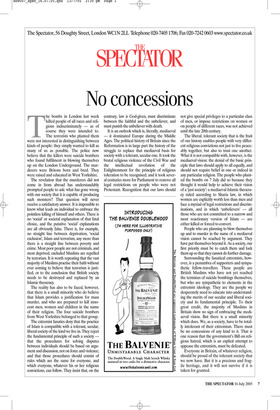No concessions
The bombs in London last week killed people of all races and religions indiscriminately — as of course they were intended to. The terrorists who planted them were not interested in distinguishing between kinds of people: they simply wanted to kill as many of us as possible. The police now believe that the killers were suicide bombers who found fulfilment in blowing themselves up on the London Underground. The murderers were Britons born and bred. They were raised and educated in West Yorkshire.
The revelation that the murderers did not come in from abroad has understandably prompted people to ask: what has gone wrong with our society that it is capable of producing such monsters? That question will never receive a satisfactory answer. It is impossible to know what leads an individual to embrace the pointless killing of himself and others. There is no ‘social’ or societal explanation of that fatal choice, and the putative ‘social’ explanations are all obviously false. There is, for example, no straight line between deprivation, ‘social exclusion’, Islam and terrorism, any more than there is a straight line between poverty and crime. Most poor people are not criminals, and most deprived, excluded Muslims are repelled by terrorism. It is worth repeating that the vast majority of Muslims practise their faith without ever coming to believe that terrorism is justified, or to the conclusion that British society needs to be destroyed and replaced by an Islamic theocracy.
The reality has also to be faced, however, that there is a small minority who do believe that Islam provides a justification for mass murder, and who are prepared to kill innocent men, women and children in the name of their religion. The four suicide bombers from West Yorkshire belonged to that group.
The extremist fanatics deny that the practice of Islam is compatible with a tolerant, secular, liberal society of the kind we live in. They reject the fundamental principle of such a society that the procedures for solving disputes between individuals should be based on argument and discussion, not on force and violence; and that those procedures should consist of rules which are the same for everyone, and which everyone, whatever his or her religious convictions, can follow. They insist that, on the contrary, law is God-given, must discriminate between the faithful and the unbeliever, and must punish the unbeliever with death.
It is an outlook which is, literally, mediaeval — it dominated Europe during the Middle Ages. The political history of Britain since the Reformation is in large part the history of the struggle to replace that mediaeval basis for society with a tolerant, secular one. It took the brutal religious violence of the Civil War and the intellectual revolution of the Enlightenment for the principle of religious toleration to be recognised; and it took several centuries more for Parliament to remove all legal restrictions on people who were not Protestant. Recognition that our laws should not give special privileges to a particular class of men, or impose restrictions on women or on people of different races, was not achieved until the late 20th century.
The liberal, tolerant society that is the fruit of our history enables people with very different religious convictions not just to live peaceably together, but also to trust one another. What it is not compatible with, however, is the mediaeval vision: the denial of the basic principle that laws should apply to all equally, and should not require belief in one or indeed in any particular religion. The people who planted the bombs on 7 July did so because they thought it would help to achieve their vision of a ‘just society’: a mediaeval Islamic theocracy ruled according to Sharia law, in which women are explicitly worth less than men and face a myriad of legal restrictions and discriminations, and in which ‘unbelievers’ — all those who are not committed to a narrow and most reactionary version of Islam — are either killed or forced to convert.
People who are planning to blow themselves up and to murder in the name of a mediaeval vision cannot be reached by argument. They have put themselves beyond it. As a society, our first priority must be to catch them and lock them up so that they cannot do further damage.
Surrounding the fanatical extremists, however, is a penumbra of supporters and sympathetic fellow-travellers. These people are British Muslims who have not yet reached the terminus of suicide bombings themselves, but who are sympathetic to elements in the extremist ideology. They are the people we desperately need to educate into understanding the merits of our secular and liberal society and its fundamental principle. To their great credit, the majority of Muslims in Britain show no sign of embracing the mediaeval vision. But there is a small minority which does. We, as a society, have to be totally intolerant of their extremism. There must be no concessions of any kind to it. That is one reason that the government’s Bill on religious hatred, which is an explicit attempt to appease the extremists, must be defeated.
Everyone in Britain, of whatever religion, should be proud of the tolerant society that we now have. But it is a precious and fragile heritage, and it will not survive if it is taken for granted.


























































 Previous page
Previous page